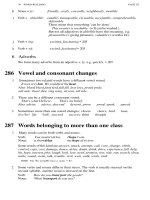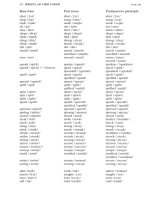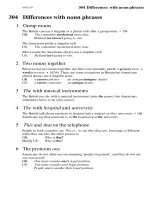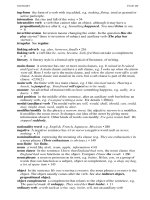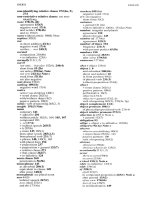Tài liệu Oxfore guide to english grammar part 55 doc
Bạn đang xem bản rút gọn của tài liệu. Xem và tải ngay bản đầy đủ của tài liệu tại đây (102.63 KB, 7 trang )
36 WORD-BUILDING PAGE 372
h Noun + ly: friendly, costly, cowardly, neighbourly, monthly
i Verb + able/ible: eatable, manageable, excusable, acceptable, comprehensible,
defensible
These mean that something 'can be done'.
This sweater is washable. (= It can be washed.)
But not all adjectives in able/ible have this meaning, e.g.
pleasurable (= giving pleasure), valuable (= worth a lot).
j Verb + ing: exciting, fascinating • 203
k Verb + ed: excited, fascinated • 203
6 Adverbs
We form many adverbs from an adjective + ly, e.g. quickly. • 207
286 Vowel and consonant changes
2 There can be a different consonant sound.
That's what I believe. That's my belief.
Also: advise advice, descend descent, prove proof, speak speech
3 Sometimes more than one sound changes: choose choice, lend loan,
287 Words belonging to more than one class
1 Many words can be both verbs and nouns.
Verb: You mustn't delay. I hope I win.
Noun: a short delay my hope of victory
Some words of this kind are answer, attack, attempt, call, care, change, climb,
control, copy, cost, damage, dance, delay, doubt, drink, drive, experience, fall, help,
hit, hope, interest, joke, laugh, look, love, need, promise, rest, ride, run, search, sleep,
smile, sound, swim, talk, trouble, visit, wait, walk, wash, wish.
NOTE For We swim/We have a swim, • 87.
2 Some verbs and nouns differ in their stress. The verb is usually stressed on the
second syllable, and the noun is stressed on the first.
Verb: How do you trans'port the goods?
Noun: What 'transport do you use?
live
life
, succeed success, think thought
Also: blood bleed,food feed,full fill, lose loss, proud pride,
sell sale, shoot shot, sing song, sit seat, tell tale
1 Sometimes two related words have a different vowel sound.
It was very hot. We could feel the heat.
Some words of this kind are conflict, contest, contrast, decrease, discount, export,
import, increase, insult, permit, produce, progress, protest, rebel, record, refund,
suspect, transfer, transport.
NOTE For nouns formed from phrasal verbs, e.g. hold-up, •231(7).
Some concrete nouns can also be verbs.
He pocketed the money. (= put it in his pocket)
We've wallpapered this room. (= put wallpaper on it)
The man was gunned down. (= shot with a gun)
The goods were shipped to America. (= taken by ship)
Some others are bottle (wine), box, brake, butter (bread), garage (a car), glue,
hammer, mail, oil, parcel, (tele)phone.
Some adjectives can also be verbs.
This wind will soon dry the clothes. (= make them dry)
The clothes will soon dry. (= become dry)
Some words of this kind are calm, cool, dry, empty, narrow, smooth, warm, wet.
NOTE Some adjectives with similar meanings take en as verbs, e.g. widen. • 285(4b)
288 Nationality words
1 We form nationality words from the name of a country: Italy Italian,
France French, Japan Japanese. We can use them in different ways.
NOTE Some of these words do not refer to a political nation, e.g. European, Jewish.
a As an adjective
Italian food a French town Japanese technology a Russian novel
b As the name of a language
I learnt Italian at evening classes.
Do you speak Russian?
I don't know any Greek.
c Referring to a specific person or group of people
Debbie is married to an Italian.
There are some Russians staying at the hotel.
The Japanese were looking round the cathedral.
d Referring to a whole people
Italians are passionate about football.
The French are proud of their language.
These expressions take a plural verb.
We can also say e.g. Italian people, Russian people.
PAGE 373
288 Nationality words
The stress can make a difference to the vowel sounds. For example, progress as a
verb is
and as a noun
36 WORD-BUILDING PAGE 374
2 There are different kinds of nationality words.
a Many end in an: Italian, American, Mexican. We can add s to form a plural noun.
Three Italians are doing the course.
(The) Americans think they can see Europe in a week.
NOTE
a To this group also belong Greek, Czech, Thai, Arab and words ending in i, e.g. Pakistani,
Israeli.
The Greeks invented democracy.
b The language of the Arabs is Arabic.
b Some end in ese: Chinese, Portuguese. We cannot add s.
Several Chinese (people) were waiting in the queue.
When we talk about a whole people, we must use the or people.
The Chinese welcome/Chinese people welcome western tourists.
NOTE Swiss (= from Switzerland) also belongs in this group.
c With some words, the adjective is different from the noun.
She's Danish./She's a Dane.
I like Danish people./I like (the) Danes.
Also: Swedish/a Swede, Finnish/a Finn, Polish/a Pole, Spanish/a Spaniard,
Turkish/a Turk, Jewish/a Jew.
NOTE
From Britain we form the adjective British.
There are a lot of British people in this part of Spain.
The nouns Brit and Briton are not very usual in spoken British English.
There are a lot of Brits/Britons in this part of Spain.
This usage is rather journalistic. Brit is informal. The Americans say Britisher.
For the whole people we say the British.
The British prefer houses to flats.
d With some words, the noun has the suffix man
He's English./He's an Englishman.
Englishmen are reserved.
Also: Welsh/a Welshman, Irish/an Irishman, French/a Frenchman, Dutch/a
Dutchman.
For a whole people, we can use the adjective with the or people.
The English are/English people are reserved.
NOTE
a It is less usual to use woman as a suffix, but we can use an adjective + woman.
The English woman works at the university.
b When we talk about people from Scotland, we can use the adjective Scottish or the nouns
Scot and Scotsman.
He's Scottish./He's a Scot/He's a Scotsman.
How do you like Scottish people/Scots?
We use Scotch mainly in fixed expressions such as Scotch whisky.
288 Nationality words
3 Here is an overview of nationality words.
Adjective Person/man A whole people
Africa African an African Africans
America American an American (the) Americans
Arab/Arabic an Arab (the) Arabs
Asia Asian an Asian Asians
Australia Australian an Australian (the) Australians
Austria Austrian an Austrian (the) Austrians
Belgium Belgian a Belgian (the) Belgians
Brazil Brazilian a Brazilian (the) Brazilians
Britain British • (2c) Note the British
China Chinese a Chinese the Chinese
Czech Republic Czech a Czech (the) Czechs
Denmark Danish a Dane (the) Danes
England - English an Englishman the English
Europe European a European Europeans
Finland Finnish a Finn (the) Finns
France French a Frenchman the French
Germany German a German (the) Germans
Greece Greek a Greek (the) Greeks
Holland Dutch a Dutchman the Dutch
Hungary Hungarian a Hungarian (the) Hungarians
India Indian an Indian (the) Indians
Ireland Irish an Irishman the Irish
Israel Israeli an Israeli (the) Israelis
Italy Italian an Italian (the) Italians
Japan Japanese a Japanese the Japanese
Jewish a Jew (the) Jews
Mexico Mexican a Mexican (the) Mexicans
Norway Norwegian a Norwegian (the) Norwegians
Pakistan Pakistani a Pakistani (the) Pakistanis
Poland Polish a Pole (the) Poles
Portugal Portuguese a Portuguese the Portuguese
Russia Russian a Russian (the) Russians
Scotland Scottish a Scotia Scotsman (the) Scots
Spain Spanish a Spaniard the Spanish
Sweden Swedish a Swede (the) Swedes
Switzerland Swiss a Swiss the Swiss
Thailand Thai a Thai (the) Thais
Turkey Turkish a Turk (the) Turks
Wales Welsh a Welshman the Welsh
PAGE 375
PAGE 376
37
Word endings: pronunciation and
spelling
289 Summary
Some words have grammatical endings. A noun can have a plural or possessive
form: friends, friend's. A verb can have an s-form, ed-form or ing-form: asks, asked,
asking. Some adjectives can have a comparative and superlative form: quicker,
quickest. A word can also end with a suffix: argument, idealist, weekly, drinkable.
When we add these endings to a word, there are sometimes changes in
pronunciation or spelling.
The s/es ending • 290
290 The s/es ending
To form a regular noun plural or the s-form of a verb, we usually add s.
rooms games looks opens hides
After a sibilant sound we add es.
kisses watches bushes taxes
But if the word ends in e, we add s.
places supposes prizes
match matches
The ed ending •291
wait waited
Leaving out e • 292
make making insure insurance
The doubling of consonants • 293
big bigger regret regrettable
Consonant + y • 294
easy easily beauty beautiful
